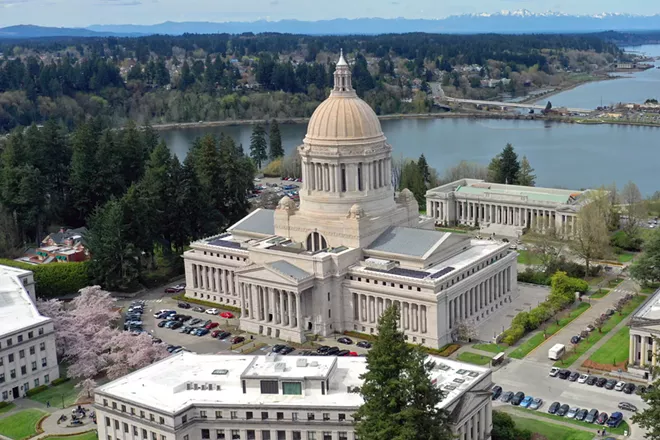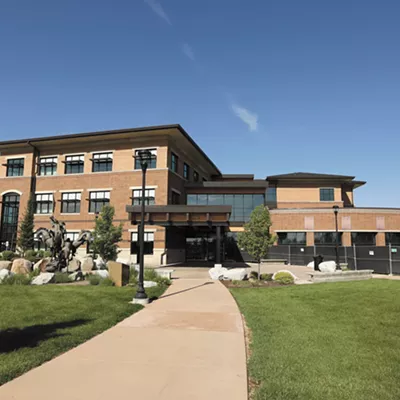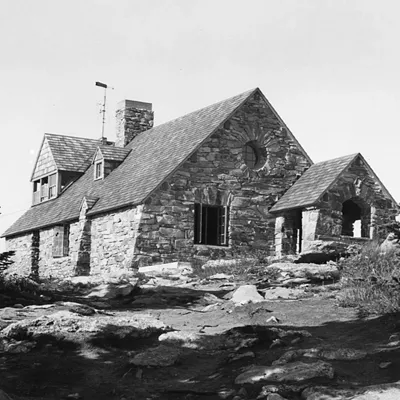By Joseph O’Sullivan / Crosscut.com / March 27, 2023
Democratic budget writers in the Washington Legislature want to plow billions of new dollars into climate-change projects, K-12 schools, and substance-use and mental health programs, according to their budget proposals for the next two fiscal years.
But perhaps the most notable focus of the proposed two-year operating budgets released by House and Senate leaders in recent days: They put billions into raises for state employees and provide more money to pay workers like home care providers and employees of assisted living facilities, adult family homes and care facilities.
Since January, leaders in the Democratic-controlled Legislature have said a major focus of this year's 105-day session is to address a labor market that was discombobulated by the pandemic and other societal shifts. The state has long been short of some workers, like staff for mental health facilities and, more recently, ferry workers and state troopers. Meanwhile, privately run facilities that are reimbursed by the state government — such as assisted living and skilled nursing facilities — have also struggled to find employees.
The House budget released Monday afternoon includes more than $2 billion for state worker raises and reimbursement-rate increases for private facilities, according to Rep. Timm Ormsby, D-Spokane and chief Democratic budget writer in the House.
"Washington state wants to be a model employer; we want to be able to recruit and retain a qualified and skilled labor force," Ormsby said.
The dollars for private facilities will benefit the physical care workers like home care providers who don't earn as much as other health care workers, said Rep. Nicole Macri, D-Seattle.
A greater share of those workers tend to be women of color "who have been hit hard by the increased costs of living," Macri said.
The proposed House budget would spend nearly $70 billion over the next two years, an increase from the $59 billion budget approved two years ago. Among other things, it would expand the number of K-12 schools providing free breakfast and put $172 million toward boosting special education in K-12 schools.
The House budget also makes room to make debt payments in the event the Legislature approves — and voters in November ratify — a $4 billion bond proposal put forward by Gov. Jay Inslee to fund construction of affordable housing.
Washington's operating budget directs spending on a host of programs that impact the entire state. The blueprint pays for the prison and mental health systems, parks and public lands, wildfire response, schools, and economic assistance programs.
Similarly, the proposed Senate operating budget released last week puts nearly $2 billion into state employee raises and increases funding for care facilities.
That Senate proposal also boosts the special-education budget by a larger amount than the House plan, with an increase of $372 million for school districts across the state. It includes an additional $100 million to help schools provide transportation for students with special needs, those experiencing homelessness and foster children, according to Sen. Christine Rolfes, D-Bainbridge Island.
Both House and Senate spending plans would increase funding for child care programs and put more dollars into the Amend program being rolled out in some of Washington's 12 prisons. That program seeks to reshape the culture through more humane treatment at corrections facilities. Researchers and corrections officials say the program can prepare incarcerated individuals to reenter society while also reducing the trauma and stress of corrections officers, who often encounter threats and violence while doing their jobs.
The legislative proposals come after Inslee in December released his own $70 billion spending plan. Now Democratic negotiators will sit down to hammer out a compromise among the three proposals by April 23, the scheduled end of the legislative session.
They'll ink a final deal in an economy facing a set of unique crosswinds: the labor shortage, inflation and actions by the federal government to tame cost increases.
A recent state revenue forecast showed tax collections are currently steady but expected to begin to soften in the coming years.
"It's an ambitious, solid budget, and people are nervous about the economy," Rolfes, the chief Democratic Senate budget writer, said of the upper chamber's proposal. "And the budget is setting aside the reserves to address that."
In a statement last week, Senate Minority Leader John Braun, R-Centralia, praised the Democratic Senate proposal for its special-education funding boost.
"So many kids do not have advocates in their lives to monitor their progress and insist on proper planning and implementation of strategies to meet their needs," Braun said in prepared remarks. "The tragedy of that is felt even more strongly among kids receiving special-education assistance. Among other enhancements for special education, this budget would provide money to ensure every child in Washington's special-education programs would have an advocate. It could be a game-changer for many of our students."
One area where Democrats will be negotiating among themselves for the final budget is how to spend new dollars coming in through Washington's new carbon cap-and-invest program.
The governor and House and Senate lawmakers each have their own specific list of priorities for that money.
The House operating budget would allocate nearly $56 million to speed up permitting processes for clean energy projects and would put $47 million toward climate planning processes for local governments. It earmarks an additional $25 million to the Low-Income Home Energy Assistance Program.
Other Climate Commitment Act dollars are included in the transportation and capital-construction budgets, according to House Majority Leader Joe Fitzgibbon, D-West Seattle. Lawmakers are also writing new, two-year versions of those statewide budgets.
Senate Democratic lawmakers use a bigger chunk of climate money in their operating budget proposal, which includes $225 million for projects to mitigate climate change impacts, $96 million for clean-energy projects, and $73 million for tribal governments and communities that experience greater environmental and health impacts. That proposal also would spend $151 million on utility and building assistance, and $131 million on carbon-reduction projects, and on job-skills training, among other things.
The governor's proposed budget among other things put $154 million in climate dollars toward salmon recovery and protection, as well as $50 million to help tribes, including money for relocation assistance for tribes facing the most risk from climate-change impacts. ♦
Visit crosscut.com/donate to support nonprofit, freely distributed, local journalism.



















